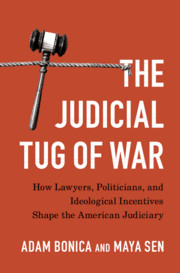 The Judicial Tug of War
The Judicial Tug of War Book contents
- Frontmatter
- Dedication
- Contents
- List of Figures
- List of Tables
- Acknowledgments
- 1 Introduction: The Tug of War Over the American Judiciary
- I The Legal Profession and the “Captured Judiciary”
- II Political Actors and the Incentive to Politicize
- 4 Politicians, Their Interests, and the Judicial Tug-of-War
- 5 Political Incentives and Politicization in the Federal Courts
- 6 Politicization in the States and Across Judicial Selection Mechanisms
- III Ramifications of the Judicial Tug-of-War
- Bibliography
- Index
- Other Books in the Series
5 - Political Incentives and Politicization in the Federal Courts
from II - Political Actors and the Incentive to Politicize
Published online by Cambridge University Press: 09 December 2020
- Frontmatter
- Dedication
- Contents
- List of Figures
- List of Tables
- Acknowledgments
- 1 Introduction: The Tug of War Over the American Judiciary
- I The Legal Profession and the “Captured Judiciary”
- II Political Actors and the Incentive to Politicize
- 4 Politicians, Their Interests, and the Judicial Tug-of-War
- 5 Political Incentives and Politicization in the Federal Courts
- 6 Politicization in the States and Across Judicial Selection Mechanisms
- III Ramifications of the Judicial Tug-of-War
- Bibliography
- Index
- Other Books in the Series
Summary
We begin our data analysis in Chapter 5, which empirically links our broad predictive theory of the judicial tug of war to the nation’s courts. This chapter examines the federal courts, the most politically important courts in the entire American judiciary. As we show in this chapter, fights over federal courts appointments illustrate the tense tug of war between the national bar and politicians. Given that federal courts appointments operate with the advice and consent of the US Senate, an elected body whose political leanings do not dovetail with the bar’s, we expect to see (and we document using empirical data) an ideological divergence. In the last decade, this divergence manifests itself in a federal judiciary that is substantially more conservative than is the national bar. As we show, this also creates supply-side incentives among legal elites. Specifically, conservative graduates of elite law programs have a much higher probability of becoming a judge (of any kind); their relative scarcity in law schools and in the academy, furthermore, has increased the importance of conservative-leaning legal associations, such as the Federalist Society.
Keywords
- Type
- Chapter
- Information
- The Judicial Tug of WarHow Lawyers, Politicians, and Ideological Incentives Shape the American Judiciary, pp. 141 - 172Publisher: Cambridge University PressPrint publication year: 2020
